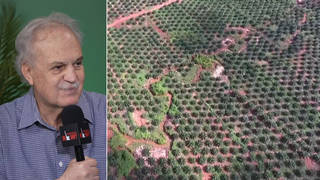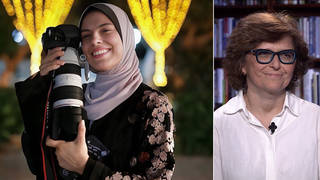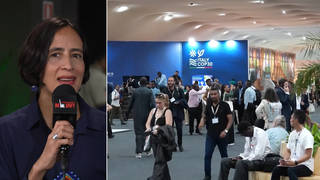
Topics
Guests
- Dr. Mona El-Farrahealth chair of the Palestinian Red Crescent Society of the Gaza Strip. She is the director of Gaza projects for the Middle East Children’s Alliance.
- Laila El-HaddadPalestinian author from Gaza City based in Columbia, Maryland. Eight members of her family were killed by Israeli strikes in Gaza on August 1. She tweets at @gazamom.
Early Friday morning, an Israeli airstrike on Khan Younis in southern Gaza killed nine members of the El-Farra family, including five children. The house was apparently hit by a rocket, causing the family and their neighbors to run onto the streets. Another rocket or missile reportedly struck the household’s members as they were fleeing. The El-Farra family are relatives of the prominent Palestinian physician Dr. Mona El-Farra, the health chair of the Palestinian Red Crescent Society of the Gaza Strip. She is also the director of Gaza projects for the Middle East Children’s Alliance. We speak to El-Farra and her niece, Laila El-Haddad, who testified about the massacre during a congressional briefing on Friday.
Transcript
AMY GOODMAN: Early Friday morning, an Israeli airstrike on Khan Younis in southern Gaza killed eight members of the El-Farra family, including five children. The house was apparently hit by a rocket, causing the family and their neighbors to run onto the streets. Another rocket or missile reportedly struck the household’s members as they were fleeing.
The El-Farra family are relatives of the prominent Palestinian physician Dr. Mona El-Farra, the health chair of the Palestinian Red Crescent Society of the Gaza Strip, also director of Gaza projects for the Middle East Children’s Alliance. She’s joining us on the phone now via Democracy Now! video stream from Gaza.
Dr. Mona El-Farra, our condolences. Can you tell us what happened?
DR. MONA EL-FARRA: Thank you for the interview. It was 2:30 in the morning when the first rocket hit the house. As we have seen—
AMY GOODMAN: If you could speak as loudly as you possibly can, because we’re having trouble hearing you.
DR. MONA EL-FARRA: Yeah. It was 2:30 in the morning that day, and the first rocket hit the house. Then the father, who is my second cousin, and the children and the rest of the family were trying to leave the house, got into the street, where the second [inaudible] hit on the side, has hit [inaudible] the house. So, it was not eight; it was nine people who were killed, and many injured. And one of my second cousins, she is very pregnant; she lost her baby in the hospital. The children were in their pajamas. And I don’t think my cousins and their grandchildren were human shields there for Hamas or anybody. For me, I’m very devastated, but my family is no different from any other family [inaudible]. Up to now, at least 60 families have been wiped away completely during those attacks. And [inaudible]—
AMY GOODMAN: We’re having a little trouble understanding you, and we have your niece on the phone with us, as well. We’ve been showing photographs of the children and the men and women in your family who have died. Laila El-Haddad is on with us, a Palestinian author from Gaza City who’s based in Columbia, Maryland, who actually just testified in Congress last week. Laila, Dr. Mona El-Farra is your aunt?
LAILA EL-HADDAD: Yes, that’s right. She’s my mother’s sister, yes.
AMY GOODMAN: And when did you get word of this attack? And explain who died.
LAILA EL-HADDAD: You know, even though I’ve been very active on social media and Twitter throughout this ordeal, I actually learned about this—I woke up that morning, and my inbox was flooded, and I was receiving dozens of text messages and Facebook and so forth, and so I actually learned about it as soon as I woke up through an email that a friend had sent me and through these various messages of condolences. And I was absolutely horrified. On some level, I also almost expected that at any moment—both my parents, who are with me here, and myself—something like this could happen, that all of us—there is no safe place—we’ve heard this over and over again—in Gaza, and at any moment any of our loved ones could be the next so-called target.
AMY GOODMAN: So how many members of the family? We’re just showing picture after picture right now.
LAILA EL-HADDAD: It was, I believe, nine, as my aunt just mentioned, five of them children. And those two youngest children were fleeing the house as that second Israeli missile targeted them and killed them. And again, these are not human shields. These are not Palestinians who have had weapons in their house—not that that would justify in any case, under international law, their assassination, their extermination from existence. But we see this happening again and again and again, young children overwhelmingly being targeted, being killed, civilians, unarmed, you know, huddled in schools or in shelters or in their homes—
AMY GOODMAN: Laila, we’re going to continue following this tomorrow. I want to thank you both for being with us, Laila El-Haddad—unfortunately, we’ve come to the end of our show—and Mona El-Farra, who’s speaking to us from Gaza.












Media Options